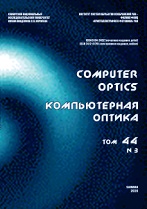|
OPTO-IT
Modeling the generation of optical modes in a semiconductor waveguide with distributed feedback formed by a space charge wave
Yu. S. Dadoyenkovaab, I. O. Zolotovskiia, I. S. Panyaeva, D. G. Sannikova
a Ulyanovsk State University (USU), 432970, Ulyanovsk, Russia, L.Tolstoy street, 42
b Lab-STICC (UMR 6285), CNRS, ENIB, 29238, France, Brest Cedex 3
Abstract:
The amplification and generation of optical TE waves arising on a lattice formed by a space charge wave in a planar waveguide based on a donor-doped semiconductor (gallium arsenide) n-GaAs are considered. The region of interaction is limited by contacts with a constant electric field applied between them, which, while operating in the Gunn oscillations suppression mode, generates a small-signal periodic inhomogeneity. Reflection and transmission regimes for same-index TE modes propagating in the waveguide structure are investigated depending on the phase mismatch and the pump level. It is shown that even with a relatively small modulation depth of the dielectric constant (about 10$^{-5}$), under conditions of high optical pumping (with a gain of about 150 cm$^{-1}$) and a corresponding detuning from phase matching there is the possibility of not only amplifying the direct and backward (reflected) optical modes, but also their generation. The advantage of the considered effects is that they enable flexible control of parameters of the dynamic lattice. The results obtained can be used to create semiconductor laser generators based on the interaction of the optical modes and a space charge wave.
Keywords:
space charge wave, light generation, semiconductor.
Received: 25.06.2019
Accepted: 15.11.2019
Citation:
Yu. S. Dadoyenkova, I. O. Zolotovskii, I. S. Panyaev, D. G. Sannikov, “Modeling the generation of optical modes in a semiconductor waveguide with distributed feedback formed by a space charge wave”, Computer Optics, 44:2 (2020), 183–188
Linking options:
https://www.mathnet.ru/eng/co777 https://www.mathnet.ru/eng/co/v44/i2/p183
|

| Statistics & downloads: |
| Abstract page: | 153 | | Full-text PDF : | 52 | | References: | 21 |
|




 Contact us:
Contact us: Terms of Use
Terms of Use
 Registration to the website
Registration to the website Logotypes
Logotypes








 Citation in format
Citation in format 